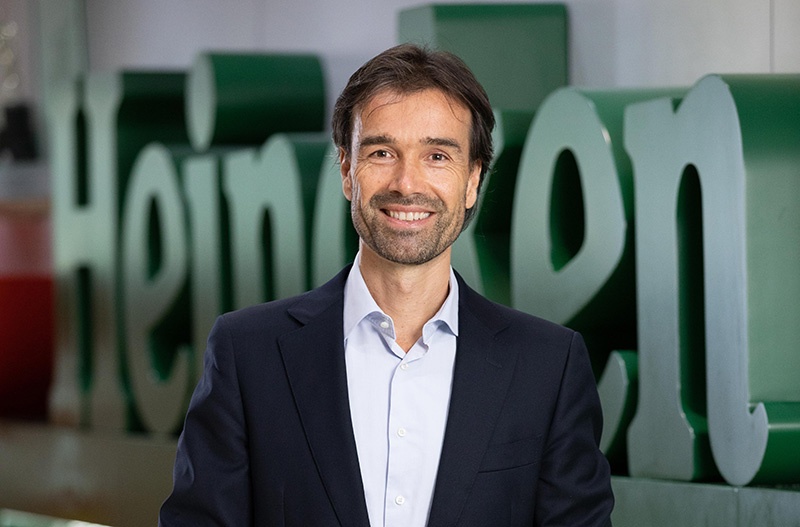EU businesses - Leading circularity action
 |
| Alexander Koch, chairman of the Dutch Business Association Vietnam (DBAV) |
The EU takes a holistic approach to the circular economy, as seen in the circular economy action plan adopted in March 2020 which is now one of the main building blocks of the European Green Deal.
The plans are coupled with concrete results. By 2018, the EU reused and recycled 47.4 per cent of its municipal waste with the aim that all waste suitable for recycling or other recovery will not be accepted to landfill by 2030.
Many EU companies have announced their targets as well. As an example, HEINEKEN in April launched our new global commitment for sustainability called Raise the Bar 2030 with an ambitious path to zero impact. In addition to carbon neutrality in production by 2030 and our full value chain by 2040, we have set specific targets to achieve zero waste to landfill for all HEINEKEN production facilities worldwide by 2025.
Circular Economy cooperation
It is great to see that the Vietnamese government is transitioning to a circular economy. The EU is fully supportive of this shift – with knowledge and expertise transfer, as well as technical and financial aid.
I am glad to see some solid progress as a result of the cooperation. For example, with the support of the Norwegian and Dutch embassies in Vietnam, the Vietnamese Ministry of Natural Resources and Environment and the United Nations Development Programme in October launched the Vietnam Circular Economy Hub. The members of the DBAV are delighted to work with Vietnam on its journey towards a more sustainable future.
The experience in Europe has shown that education should be deployed at all levels to ensure circularity becomes common knowledge. The concept then needs to be translated into specific actions for organisations, communities, and individuals.
At the same time, there needs to be a solid legal framework. The EU member countries have adopted several policies to create favourable conditions for infrastructure investment, innovation, and technical development for circularity. One particular example would be the high levy in the EU for landfill, so businesses have to think of alternative solutions for waste disposal. This encourages circularity. Another example is the practice of charging money for plastic bags in supermarkets, which discourages people from single-use plastics.
The Extended Producer Responsibility (EPR) which has been applied in European countries and is now being introduced in Vietnam’s Law on Environmental Protection 2020, is another example of good legislation. However, the key is to make it practical and to recognise and incentivise positive examples. For instance, our glass bottles are reused on average 20 times, and then sold back to the glass manufacturer for recycling and re-use. It is important that initiatives like this are considered in Vietnam’s EPR plans.
Overall, I am delighted to see that Vietnam is working with the EU and Dutch companies on designing and implementing pilot projects to support future EPR.
EU business to support the shift
In Vietnam, many EU businesses have accomplished encouraging results in circularity. HEINEKEN Vietnam, for example, has achieved practically zero waste to landfill since 2018 across all our breweries. Similarly, we operate with 56 per cent renewable energy thanks to our use of thermal biomass.
Dutch companies are ready to share our expertise, know-how, and best practices, which could greatly promote circularity. I believe it is important to see circularity in action and the benefits it brings about. While the private sector invests in innovation and technology, we also need a relevant legislative framework to support circularity and make it the way we do business.
What the stars mean:
★ Poor ★ ★ Promising ★★★ Good ★★★★ Very good ★★★★★ Exceptional
Related Contents
Latest News
More News
- Bac Ai Pumped Storage Hydropower Plant to enter peak construction phase (January 27, 2026 | 08:00)
- ASEAN could scale up sustainable aviation fuel by 2050 (January 24, 2026 | 10:19)
- 64,000 hectares of sea allocated for offshore wind surveys (January 22, 2026 | 20:23)
- EVN secures financing for Quang Trach II LNG power plant (January 17, 2026 | 15:55)
- PC1 teams up with DENZAI on regional wind projects (January 16, 2026 | 21:18)
- Innovation and ESG practices drive green transition in the digital era (January 16, 2026 | 16:51)
- Bac Ai hydropower works stay on track despite holiday period (January 16, 2026 | 16:19)
- Fugro extends MoU with PTSC G&S to support offshore wind growth (January 14, 2026 | 15:59)
- Pacifico Energy starts commercial operations at Sunpro Wind Farm in Mekong Delta (January 12, 2026 | 14:01)
- Honda launches electric two-wheeler, expands charging infrastructure (January 12, 2026 | 14:00)

 Tag:
Tag:




















 Mobile Version
Mobile Version